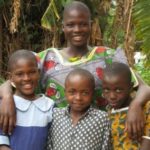
Region: Sub-Saharan Africa
Friends of Kakamega (Kakamega, KENYA) is a nonprofit organization that supports the initiatives of the Kakamega Orphan Project and Care Center, where orphaned and vulnerable children, whose parents have died of AIDS or other diseases or whose safety and wellbeing are at risk, can find resources and the opportunity for residency. Since its inception, the project has helped over 400 children through the Feeding Program (2001-2010), its Care Center Residential Facility, home-based scholarships, and high school and college sponsorships.
In 2013 alone, the project assisted 220 children, including 44 living in the Care Center, constructed by the nonprofit, 55 in residential high schools, 110 living with a relative or guardian, and 10 in college/university/vocational schools. Additionally, 300-400 individuals, mostly parents, other children, and community members, found support indirectly from the project’s activity.
IPM Project Partner Friends of Kakamega works most directly with the Self-Help Seed Project initiative, but its work indirectly supports all facets of the Kakamega Orphan Project. Most recently, in 2015, IPM’s partnership has enabled an increased amount of funding to be available for child sponsorship at the Project’s Care Center.
I. Self-Help Seed Project
IPM’s Friends of Kakamega partners with the Self-Help Seed Project that began in 2009 to support home-based families with agricultural training and start-up materials so that they learn to maintain a sustainable food source for their families.
In its first year, 30 home-based families benefited from the acre of maize planted with support through the Self-Help Seed Project. In addition to the food provided, community members reported that the joy brought from the planting, cultivation, harvest, and drying of the maize as a shared community unit was the most significant benefit of the program.
Because of its initial success, Friends of Kakamega has continued to initiate this program every year, rotating its beneficiaries amongst home-based communities that have fertile land available. Additionally, in 2013, Friends of Kakamega augmented the program to include the Alternative Seed Project, which aims to introduce crops that feed soil and do not drain it with fertilizers, such as beans, ground nuts, and sweet potatoes. Seeds for these types of crops are more expensive than maize, the traditional Kenyan crop and a main staple to the Kenyan diet, but offer a higher nutritional content and the opportunity for excess produce to be sold at market for supplemental income. Because they do not require the expensive fertilizers required for the growth of maize, the lowered cost of the crops’ maintenance helps to balance the additional cost of the seeds.
In 2014, the Self-Help Seed Project increased its beneficiaries from 30 to 50 families annually, thanks to anonymous donors and partnership with IPM.
II. Care Center Residential Facility
Located in Kakamega, KENYA, the Care Center provides shelter, food, washing facilities, and other basic necessities to orphaned children from the surrounding area, in addition to providing a the venue through which home-based families can come to receive the seed, fertilizers, technical training, and additional sums for land maintenance associated with the Self-Help Seed Project.
In January of 2014, 12 new openings were created by orphan residents who left to pursue secondary education, and were filled by new residents, ages 7-11. Residents are provided with three wholesome meals per day, dormitory with mattresses, and washrooms for bathing and cleaning clothes – many times for the first time in their lives.
III. Academic Sponsorship & Scholarships
In 2014, 16 home-based and resident orphans of the Care Center began attending secondary school in February.
Because higher education can be difficult to pursue, for all Kenyan children but especially those who have been orphaned or do not have the socioeconomic resources to afford to attend school, the Care Center is happy to provide academic assistance and exam preparation, because test scores directly affect what secondary school the child will be accepted into. Additionally, the sponsorship program provides the financial means necessary to purchase the items required to attend school, like uniforms, shoes, mattresses, soap, and academic supplies.
Home-based children benefiting from the sponsorship are also provided with food and basic living necessities to share with their guardians, in addition to attentive academic support. One home-based orphan of the 16 who achieved high enough marks in 2014 scored in the top percentile of the Western Region, earning her a scholarship to attend one of Kenya’s most prestigious all-girls secondary schools.
IV. Goals and Projections
Because of increased financial and human resource support, partially through its Emerging Partnership with IPM, Friends of Kakamega is hoping to hire an assistant to its Project Coordinator in 2015 to help in the organizational and logistical management of the project. Ideally, the increasing number of families served through the Self-Help Seed Project will continue to grow so that perhaps even more than 50 families can be provided assistance in 2015!
To make this possible, increased funding for seed and agricultural materials, as well as additional opportunities for technical on-site agricultural training, will be required. The project is also hoping for additional technical support in grant writing and project reporting in the coming year.
Learn more about Friends of Kakamega on their website.